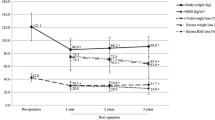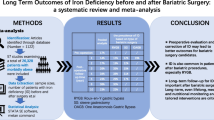Abstract
Background
Laparoscopic sleeve gastrectomy (LSG) has been recently introduced as a stand-alone, restrictive bariatric surgery. Theoretically, LSG attenuates micronutrients deficiencies and associated complications that typically observed following malabsorptive procedures. The aim of this study was to assess iron indices and the 1-year incidence of iron deficiency in patients undergoing LSG.
Methods
This was a prospective, cohort study; patients who underwent LSG from June 2007 to April 2008 at our institution were screened for inclusion. Preoperative hemoglobin and iron indices including serum iron, transferrin saturation, ferritin, and soluble transferrin receptor were compared to their levels at 6 and 12 months after surgery. Similarly, vitamin B12 and red blood cell (RBC) folate were analyzed as secondary end points. Weight parameters and C-reactive protein (CRP) levels were compared before surgery and 1 year postoperatively.
Results
A total of 61 patients were included in the study. One year after surgery, there was a significant decrease in the mean body mass index from 47.5 ± 9.6 to 30.5 ± 6.5 (P < 0.001). The incidence of iron deficiency was 4.9% at both follow-up time points. Anemia was evident in 4.9% of patients 1 year postoperatively. Significant decrease in the means of the natural logarithm of vitamin B12 and RBC folate were observed as early as 6 months after surgery (P = 0.014; P < 0.005, respectively). The decrease in mean CRP level 12 months postoperatively was statistically significant compared to its preoperative value (P < 0.0001).
Conclusion
LSG is an effective procedure for the treatment of morbid obesity and its associated inflammatory state. One year after surgery, development of iron deficiency was insignificant.
Similar content being viewed by others
References
Silecchia G, Boru C, Pecchia A, et al. Effectiveness of laparoscopic sleeve gastrectomy (first stage of biliopancreatic diversion with duodenal switch) on co-morbidities in super-obese high-risk patients. Obes Surg. 2006;16:1138–44.
Baltasar A, Serra C, Pérez N, et al. Laparoscopic sleeve gastrectomy: a multi-purpose bariatric operation. Obes Surg. 2005;15:1124–8.
Iannelli A, Dainese R, Piche T, et al. Laparoscopic sleeve gastrectomy for morbid obesity. World J Gastroenterol. 2008;14:821–27.
Cooper PL, Brearly LK, Jamieson AC, et al. Nutritional consequences of modified vertical banded gastroplasty in obese subjects. Int J Obes. 1999;23:382–8.
Wollenberg P, Rummel W. Dependence of intestinal iron absorption on the valency state of iron. Naunyn Schmiedebergs Arch Pharmacol. 1987;336:578–8.
Beard JL. Iron biology in immune function, muscle metabolism and neuronal functioning. J Nutr. 2001;131:568S–79S.
McCann JC, Ames BN. An overview of evidence for a causal relation between iron deficiency during development and deficits in cognitive or behavioral function. Am J Clin Nutr. 2007;85:931–45.
Verdon F, Burnand B, Stubi CL, et al. Iron supplementation for unexplained fatigue in non-anaemic women: double blind randomised placebo controlled trial. BMJ. 2003;326:1124–8.
O’Dell BL. Roles for iron and copper in connective tissue biosynthesis. Philos Trans R Soc Lond B Biol Sci. 1981;294:91–104.
Agha-Mohammadi S, Hurwitz DJ. Potential impacts of nutritional deficiency of post bariatric patients on body contouring surgery. Plast Reconstr Surg. 2008;122:1901–14.
Haas J, Brownlie T IV. Iron deficiency anemia and reduced work capacity: a critical review of the research to determine a causal relationship. J Nutr. 2001;131:676S–90S.
National Institutes of Health. Clinical guidelines on the identification evaluation, and treatment of overweight and obesity in adults: the evidence report. Obes Res. 1998;6:51S–209S.
Malinowski SS. Nutritional and metabolic complications of bariatric surgery. Am J Med Sci. 2006;331:219–25.
Lee CM, Cirangle PT, Jossart GH. Vertical gastrectomy for morbid obesity in 216 patients: report of two-year results. Surg Endosc. 2007;21:1810–6.
Skroubis G, Sakellaropoulos G, Pouggouras K, et al. Comparison of nutritional deficiencies after Roux-en-Y gastric bypass and after biliopancreatic diversion with Roux-en-Y gastric bypass. Obes Surg. 2002;12:551–8.
Vargas-Ruiz AG, Hernández-Rivera G, Herrera MF. Prevalence of iron, folate, and vitamin B12 deficiency anemia after laparoscopic Roux-en-Y gastric bypass. Obes Surg. 2008;18:288–93.
Esposito K, Pontillo A, Di Palo C, et al. Effect of weight loss and lifestyle changes on vascular inflammatory markers in obese women: a randomized trial. JAMA. 2003;289:1799–804.
Ausk KJ, Ioannou GN. Is obesity associated with anemia of chronic disease? A population-based study. Obesity (Silver Spring). 2008;16:2356–61.
Anty R, Dahman M, Iannelli A, et al. Bariatric surgery can correct iron depletion in morbidly obese women: a link with chronic inflammation. Obes Surg. 2008;18:709–14.
Hakeam HA, O’Regan PJ, Salem AM, et al. Inhibition of C-reactive protein in morbidly obese patients after laparoscopic sleeve gastrectomy. Obes Surg. 2008;91:456–60.
Zagorski SM, Papa NN, Chung MH. The effect of weight loss after gastric bypass on C-reactive protein levels. Surg Obes Relat Dis. 2005;1:81–5.
Brittenham GM, Weiss G, Brissot P et al. Clinical Consequences of New Insights in the Pathophysiology of Disorders of Iron and Heme Metabolism. Hematology Am Soc Hematol Educ Program. 2000:39–50
Marković M, Majkić-Singh N, Ignjatović S, et al. Reticulocyte haemoglobin content vs. soluble transferrin receptor and ferritin index in iron deficiency anaemia accompanied with inflammation. Int J Lab Hematol. 2007;29:341–6.
Brolin RE, Leung M. Survey of vitamin and mineral supplementation after gastric bypass and biliopancreatic diversion for morbid obesity. Obes Surg. 1999;9:150–4.
Howden CW. Vitamin B12 levels during prolonged treatment with proton pump inhibitors. J Clin Gastroenterol. 2000;30:29–33.
Brolin RE, Gorman JH, Gorman RC, et al. Are vitamin B12 and folate deficiency clinically important after roux-en-Y gastric bypass? J Gastrointest Surg. 1998;2:436–42.
Conflict of interest
The authors do not have any conflict of interest to report.
Author information
Authors and Affiliations
Corresponding author
Rights and permissions
About this article
Cite this article
Hakeam, H.A., O’Regan, P.J., Salem, A.M. et al. Impact of Laparoscopic Sleeve Gastrectomy on Iron Indices: 1 Year Follow-Up. OBES SURG 19, 1491–1496 (2009). https://doi.org/10.1007/s11695-009-9919-2
Received:
Accepted:
Published:
Issue Date:
DOI: https://doi.org/10.1007/s11695-009-9919-2




